Do you have Irritable Bowel Syndrome (IBS)? Are you tired of eating high fiber weeds for sustenance; never allowed by your stomach to enjoy the finer tastes in life? If you answered yes, just know you’re not alone. With an estimated 15% of the population suffering from this sometimes life altering disease, there has to be a better IBS diet out there. So, the question, is there a good Irritable Bowel Syndrome Diet?
Irritable Bowel Syndrome Diet: What is IBS and Why Do I Need an IBS Diet?
Everyone gets an upset stomach from time to time. Odds are you have probably even been fairly sick with a stomach virus. But . . . do you spend each moment you’re in public, whether it be:
- Work
- School
- Church
- Public events
Constantly worried that at any moment you’re going to have an “emergency,” and have to rush to the closest bathroom. As a matter of fact, many people with IBS plan their public activities to make sure they have quick access to restroom facilities. That’s what it means to have IBS, and for that kind of inconvenience, it’s worth it to investigate an Irritable Bowel Syndrome Diet that can help you reduce symptoms.
Irritable Bowel Syndrome Diet: Definition of IBS
Irritable Bowel Syndrome is a chronic (long term), symptom diagnosed syndrome whose presenting issues are:
- Persistent Diarrhea
- Persistent Constipation
- Persistent Alternating Bowel Habits (Diarrhea/Constipation)
- Abdominal Pain and Discomfort
- Hair and Weight Loss
- Stress
These extreme life altering conditions are what constitute the need for an Irritable Bowel Syndrome Diet.
There are other treatments which will be discussed later, but sufferers of IBS often say the number one reliever of the symptoms listed above is diet.
IBS Diet: Diagnosis
IBS is a “diagnosis of exclusion.” What that means is that it is only diagnosed after ruling out many of the other gastrointestinal diseases. Often misdiagnosed as:
- Common Diarrhea
- Coeliac Disease
- Bile Acid and Sugar Malabsorptions
Irritable Bowel Syndrome is not an easily diagnosed condition. There are several illnesses that often accompany IBS, and as a result this also leads to misdiagnosis.
- Headaches
- Fibromyalgia
- Chronic Fatigue Syndrome
- Inflammatory Bowel Disease
- Other Psychiatric Conditions
All the aforementioned often accompany IBS in patients. That’s why the diagnosis and subsequent use of an Irritable Bowel Syndrome Diet is so important. Treating the wrong condition can only exacerbate the problem. Many doctors will run a complete battery of tests to rule out other syndromes and diseases. They will check:
- Blood in the stool (visible and unseen)
- Multiple blood tests
- Abdominal ultrasounds
- Endoscopy and Colonoscopy with Biopsies
- Other chemical tests
Once these tests produce no positive results the doctor will ask a set of algorithmic questions known as the Rome III Process. These are questions designed to test the IBS criteria against what symptoms the patient is experiencing. They include:
- Do your symptoms cease after you defecate (poop?)
- Did the symptoms start with a change in how often you defecate? More or less often?
- Did symptoms start with a change in the form (appearance) of your defecations?
- Has the number of times you defecate gone to more than 3 times a day, or less than 3 times a week?
- Has the appearance and form of your feces changed? (lumpy/hard or watery/soft)
- Has the way it feels to defecate changed? (strained, urgent, left feeling unfinished)
- Have you passed any mucus?
- Do you feel bloated a lot, or is your belly distended (bulging)?
IBS: Cause
There is no known organic cause of Irritable Bowel Syndrome, but several promising hypotheses are being investigated:
- Certain germs (Protozoan or Amoebic)
- Misfire between the Brain-Gut Axis (nerve connections between the brain and gastrointestinal tract)
- A yet undiscovered germ
Irritable Bowel Syndrome Diet: Treatment
There are several commonly used treatments which are often used in combination to treat Irritable Bowel Syndrome.
*Medications – laxatives, neuro & musculotropics, antispasmotics, serotonin level drugs and psychiatric
*Psycho Therapy – to manage the extreme stress that often associates the disease
*Exercise
* Irritable Bowel Syndrome Diet
Irritable Bowel Syndrome Diet: What Can I Eat?
The answer to that question in the past has been a drab, bland, and tasteless answer. The focus of previous Irritable Bowel Syndrome Diet has been high fiber with little or no spice. This made for reduced symptoms, but little in the way of dining enjoyment. As more people have come forward with IBS symptoms and diagnoses, the support community has increased and the problems associated with the illness have been tackled.
Is There a Good IBS Diet?
Yes, there’s probably an IBS Diet that will suit you. There is a multitude of Irritable Bowel Syndrome Diet information out there. Diet books and recipes abound, and with a little effort you can find one that’s right for you. If you suffer from IBS and you are at your wits end with the difficulties presented by this often debilitating condition, look toward your Irritable Bowel Syndrome Diet for answers.
What is the best Irritable Bowel Syndrome Diet?
a. High in sugars and fats
b. Low in fiber
c. Whatever diet works best to reduce your symptoms
d. The diet that gives you the most symptoms
True or False, IBS is just like any other stomach ache.
a. False
b. True
What is the algorithm used to diagnose Irritable Bowel Syndrome?
a. Hemocult Blood Test
b. Liver Function Testing
c. Throwing salt over your right shoulder
d. Rome III Process
Answers at the bottom of the page!

TuZen Probiotic- The Natural Solution for IBS
TuZen is a lactobacilli bacterium that lines the walls of the stomach and intestines, and prevents harmful 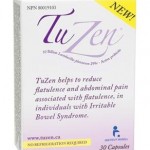 bacteria from irritating the gastrointestinal system. This greatly reduces the symptoms of Irritable Bowel Syndrome (IBS). TuZen is an extensively studied probiotic supplement, and has been found beneficial to IBS sufferers.
bacteria from irritating the gastrointestinal system. This greatly reduces the symptoms of Irritable Bowel Syndrome (IBS). TuZen is an extensively studied probiotic supplement, and has been found beneficial to IBS sufferers.
Thoughts
Sufferers of IBS often experience life altering affects from the illness. The pain and discomfort are only compounded by the constant stress of this disease. Not knowing when or where it might strike can be limiting in your lifestyle. Any product that helps reduce, eliminate, or control the dire symptoms of IBS should be a welcome addition to your arsenal of IBS defenses.
-eBook on IBS Secrets
Irritable Bowel Syndrome – Secrets
This handy and useful eBook is chalk full of information about Irritable Bowel Syndrome. It covers a wide range of topics, and provides hints on how to deal with some of the stickier issues relating to IBS. It covers many of the 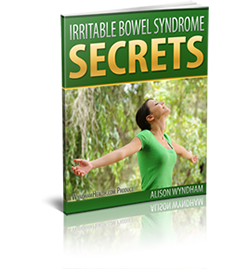 possible causes and what might be contributing to your symptoms. It also gives many hints at how to better manage your symptoms.
possible causes and what might be contributing to your symptoms. It also gives many hints at how to better manage your symptoms.
Thoughts
No one said IBS was going to be an easy fix; it isn’t. There are however things you can do to help yourself, and what Alison Wyndham has done is collect a multitude of those helpful hints and remedies in one place. With practical and handy guides on diet, medications, and staying mentally tough, this eBook “hits the spot” when it comes to dealing with IBS.
Answers: 1) c, 2) a, 3) d


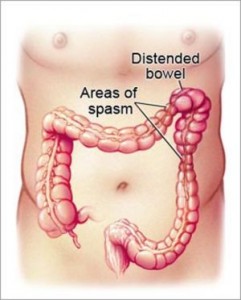

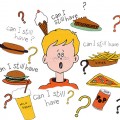

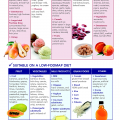
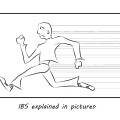

April 2, 2013 at 2:30 pm
Is the best option for IBS sufferers to start eliminating one thing at a time from their diets and see if that makes it better? And hopefully add it back in when it doesn’t? lol
April 5, 2013 at 5:33 pm
Phillip this is a great question. You can use that method, and it will likely show some results, but it may be a better idea to keep a comprehensive Food Diary where you look for patterns. it is often groups, or types of foods that cause Irritable Bowel Syndrome symptoms. Let us know what you find that works for you.